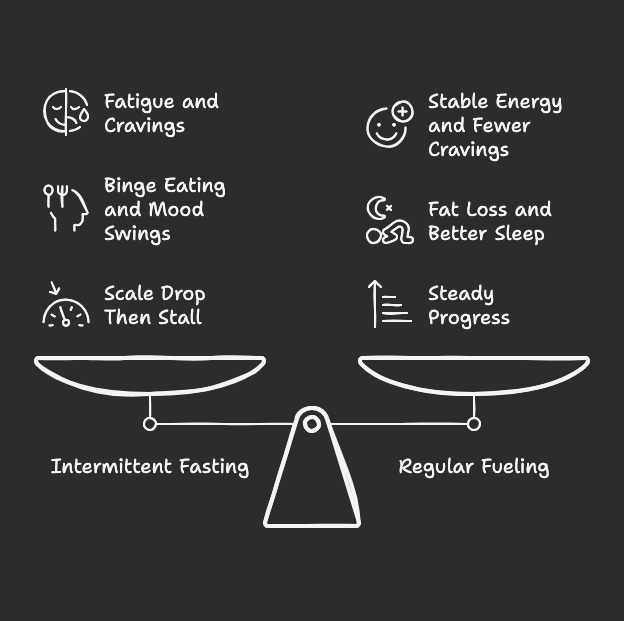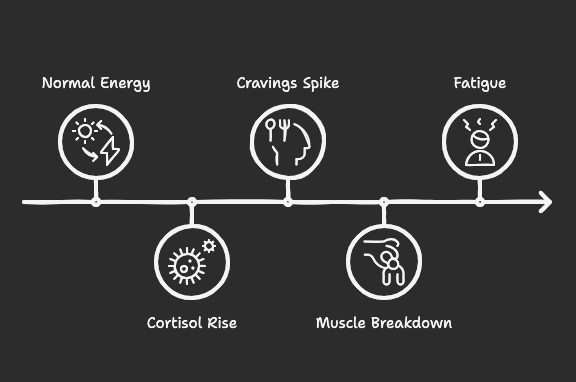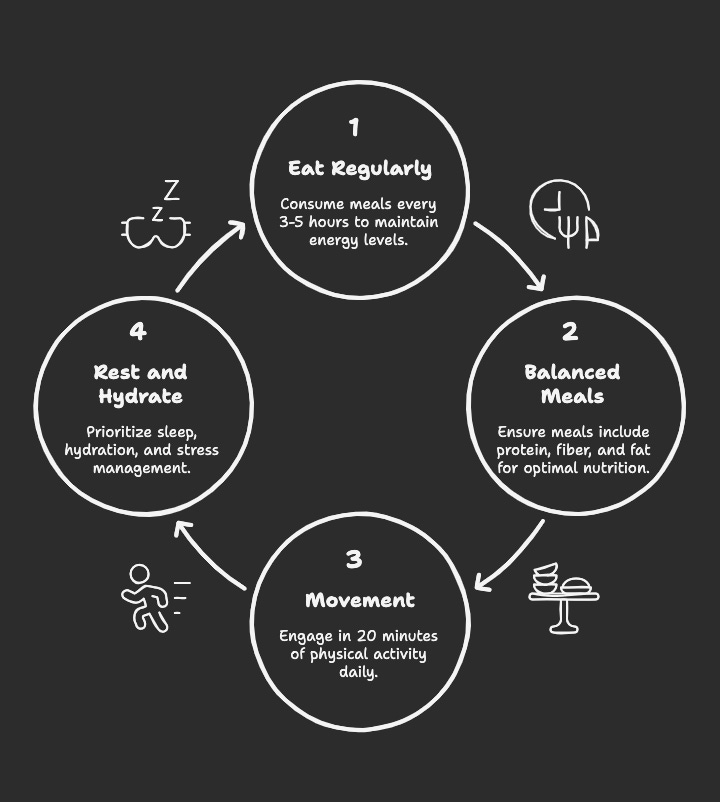Why Intermittent Fasting Isn’t Helping You Lose Weight (Especially If You’re a Busy Woman)
You’ve probably heard this before:
“If you want to lose weight fast, try intermittent fasting.”
It sounds simple enough.
Skip breakfast, eat in a small window, cut out the extra calories, and BOOM you’ll start to see the scale drop.
So you think…
But here’s the problem…
What you’re losing in those first few weeks is mostly water.
Maybe some muscle.
But rarely 100% (heck rarely 50%) fat.
And the worst part is the habits that help you start losing weight with fasting…
Are the same ones that make it hard to keep that weight off.
Most women I work with inside the Inner Circle came to me after months (sometimes YEARS) of using intermittent fasting, thinking it was the “smarter” or “quicker” way to lose fat.
But they ended up stuck in the same frustrating cycle:
Lose 5 pounds
Feel “in control”
Binge on the weekend
Gain it all back by Monday
If that’s you, there’s nothing wrong with you.
You’ve just been told that eating less often is the secret to your fat loss.
But it’s not.
Because when you’re a busy mom running around after kids or managing a business from home, skipping meals doesn’t make you “disciplined.”
It just ends up draining you.
It makes your cravings louder.
Your energy lower.
Your patience thinner.
The truth is…
If you’re trying to lose weight and keep it off, fasting might be slowing you down.
That’s what todays letter is here to fix.
I’m not going to give you another rigid eating window or list of foods to avoid.
Instead, I’ll show you a simpler approach that:
Works with your real-life routine
Doesn’t require you to skip meals
Actually gets results that last
And if you’re tired of the cycle, this is the place you’ll finally break free from it.
Let’s get into it.
Why Intermittent Fasting Feels Like It's Working (But Isn’t)
So many women swear intermittent fasting works…. at first.
Lets say you skip breakfast, maybe push your first meal to noon.
And by the end of the week, the scale drops.
So you feel proud. Lighter. And in control.
But what’s really happening?
Here’s the breakdown:
🔹 You Lose Water—Not Fat
When you cut back on food, especially carbs, your body loses water fast.
That shows up as a 3–5 lb drop almost instantly.
But it’s not real fat loss.
It’s just less water in your system.
So when you eat “normally” again?
That weight creeps right back.
🔸 Hunger Gets Mistaken for Progress
Feeling hungry makes you think you’re burning fat.
But that tight stomach, that lightheaded feeling?
That’s not fat melting—it’s your body signaling stress.
You’re not “burning more.”
You’re running on empty.
And when your energy drops…
So does your movement, mood, and metabolism.
🔹 You Feel “Disciplined”—But It Doesn’t Last
IF gives you that quick dopamine hit:
“I stuck to my window.”
“I only ate once today.”
“I was so good.”
But discipline without sustainability is a trap.
Skipping meals feels “strong” at first…
Until your willpower wears thin.
That’s when cravings hit hard.
And the guilt comes even harder.
🔸 It Works Against a Mom’s Real Life
When your days are packed with school runs, housework, Zoom calls, or grocery trips…
Not eating for 16 hours doesn’t make things easier.
It makes everything harder.
Your patience wears down.
You snap faster.
You start thinking about food all day.
And eventually, you eat.
But once you start? It’s hard to stop.
Not because you “lack discipline.”
But because your body’s just trying to survive.
Here’s what I’ve seen with hundreds of women:
You restrict all morning
You finally eat late in the day
You overeat without realizing it
You feel guilty and repeat the cycle
And then you blame yourself.
But the real problem isn’t you.
It’s the plan that asks you to ignore your body’s basic needs.
The longer you ignore hunger signals, the louder they get.
And when your body starts panicking, your brain starts craving comfort.
That’s not failure. That’s biology.
What’s Actually Going On In Your Body When You Skip Meals
Let’s look past the scale for a second because what’s happening inside your body when you fast matters more than what shows up on the outside.
And if you’ve been skipping meals thinking it’s helping your fat loss, here’s the truth:
1️⃣ - Your Hunger Hormones Go Haywire
Your body runs on rhythm.
When you skip meals, you disrupt that rhythm.
Ghrelin (the hunger hormone) spikes higher each hour you go without food.
Leptin (the fullness hormone) stops working as well.
You become more sensitive to cravings—and less satisfied when you finally eat.
This is why most women who fast end up bingeing later in the day.
It’s not because you’re weak.
It’s because your hormones are screaming for food.
2️⃣ - Cortisol Goes Up (And Fat Loss Slows Down)
Skipping meals = stress. Even if it feels “fine” at first.
Your body sees food restriction as a threat.
That triggers cortisol, your stress hormone.
When cortisol is elevated:
Your body holds onto fat (especially belly fat).
You feel anxious, foggy, and reactive.
Sleep suffers.
Cravings skyrocket.
In short: fasting puts your body in survival mode.
And when you’re in survival mode, your body’s priority isn’t fat loss—it’s protection.
3️⃣ - Muscle Loss = Slower Metabolism
This one’s huge—and rarely talked about.
When you go long periods without eating, your body doesn’t just burn fat.
It starts breaking down muscle for energy.
Muscle is your metabolism’s best friend.
The more you have, the more calories you burn at rest.
Lose muscle and You burn fewer calories—even while doing “everything right.”
And because you can’t see muscle loss on a scale, it tricks you into thinking fasting is working when it’s actually hurting your long-term results.
4️⃣ - Blood Sugar Drops—and Then Overcorrects
When you skip meals, your blood sugar dips.
You feel tired, dizzy, irritable.
Then you eat something—anything—and it spikes.
Now you’re on a rollercoaster.
That’s why fasting often leads to:
Mood swings
Energy crashes
Late-night snacking
Constant food thoughts
These swings mess with your body’s ability to regulate hunger, energy, and cravings.
5️⃣ - Your Body Learns to Adapt (In the Worst Way)
Do something long enough, and your body adapts.
If you regularly skip meals:
Your body starts expecting less food
Your metabolism adjusts down
You burn fewer calories daily
So even if you eat a “normal” amount of food later, your body stores more of it because it’s learned that food is scarce.
Over time, this means gaining weight while eating less.
Which can 100% be Frustrating.
But again, it’s not your fault.
You’re following a method that doesn’t match how your body actually works.
Skipping meals isn’t just unsustainable—it’s counterproductive.
Especially when your goal is lasting, lifestyle-based fat loss.
What Works Better Than Fasting for Busy Moms
If fasting isn’t the answer…
Then what is?
What most programs don’t tell you is that you don’t need fewer meals.
You need better meals—spread throughout the day evenly
Why Eating More Often Actually Works
When you feed your body regularly with the right foods, you…
Reduce cravings before they hit
Stabilize your energy all day
Keep your metabolism working for you
Stay more patient with your family
Lose fat without feeling restricted
Sounds simple, right?
That’s because it is.
Instead of skipping meals:
Eat 3 balanced meals per day
Add 1 small snack (especially in the afternoon)
Include protein + fiber + healthy fat at each meal
Space meals every 3–5 hours to avoid crashes
This keeps blood sugar steady.
Reduces cortisol.
And keeps you from hitting that “I need something sweet now” wall.
Why This Is a Game-Changer for Moms
You’re not just managing you all day.
You’re managing…
Schedules
Kids
Errands
Work
The mental load of remembering everything
Skipping meals in the middle of that chaos is like trying to drive across town on an empty tank.
You can, but you’ll stall.
By fueling your body before you hit empty, you avoid the crash, allowing you show up better for everything else in your day.
This Isn’t About Eating Perfectly, It’s about eating consistently.
When you stop thinking food is the enemy and start seeing it as fuel, everything gets easier:
You stop obsessing over food
You stop binging at night
You stop feeling like a failure every time you eat “too much”
No More Willpower Battles
When you’re nourished, you don’t need willpower.
You’re calmer.
More focused.
And more in control.
That’s how real, sustainable fat loss happens.
Not by skipping meals or “being good.”
But by giving your body what it needs—when it needs it.
What To Focus On Instead (Your Better Fat Loss Formula)
You don’t need another diet to follow.
You need a way to approach your day that feels doable—even when life’s chaotic.
Here’s what that looks like in real life 👇🏻
(Your 4-Part Fat Loss Formula)
1️⃣ - Eat Every 3–5 Hours
Don’t wait until you’re starving.
Start your day with a real meal.
Then eat again before you crash.
This simple shift:
Regulates blood sugar
Lowers cravings
Makes overeating later less likely
2️⃣ - Build Every Meal Around 3 Things
Forget counting calories or macros for a second and just focus on this:
Protein (chicken, eggs, yogurt, protein powder)
Fiber (veggies, fruit, oats, lentils)
Fat (avocado, olive oil, nuts, cheese)
This combo keeps you full and satisfied.
It also keeps your metabolism working without the spikes and crashes.
3️⃣ - Move 20 Minutes Per Day
Not cardio marathons. Not 2-hour strength sessions.
Just 20 minutes of intentional movement.
Examples:
A walk around the block
A 15-min bodyweight circuit
A short strength session between meetings
A dance break with your kids
Consistent, low-stress movement beats all-or-nothing intensity every time.
4️⃣ - Prioritize the “Forgotten 3”
Fat loss isn’t just food and workouts.
These 3 habits matter more than people realize:
Sleep: Aim for 7–8 hours (as best you can)
Water: Start with 60–80 oz daily
Stress: Take 5–10 minutes daily for you—deep breathing, journaling, quiet
When these are in place, fat loss gets easier.
Not overnight. But definitely over time.
With this formula, you’ll start to notice:
Your energy lasts longer
You’re not thinking about food all day
You naturally eat less without tracking anything
You recover faster, sleep better, and feel less frantic
And the best part?
It doesn’t require you to:
Skip meals
Cut out your favorite foods
Obsess over every bite
This is fat loss designed for YOUR lifestyle.
And if you want a weekly plan that shows you exactly how to do this in real time, we’re about to talk about that too.
But first—let’s tackle some of the most common concerns about eating more often to lose weight.
Common Questions About “Eating More to Lose Weight”
If the idea of not skipping meals makes you nervous, you’re not alone.
Most women I work with inside the inner circle have the same reaction at first.
Let’s clear up some of the biggest concerns right now.
Q1 - “But I feel better when I don’t eat in the morning.”
That’s not energy - it’s your stress hormones.
When you fast, your body pumps out cortisol to keep you alert.
You might feel sharper, but you’re borrowing energy.
And you’ll pay for it later:
Crashes in the afternoon
Binge-style eating at night
Trouble sleeping
Increased belly fat from chronic stress
Try eating a small high-protein breakfast for 7 days.
Watch how your energy holds up and how your cravings drop.
Q2 - “Won’t I gain weight if I eat more often?”
Not if you’re eating the right foods at the right times.
What matters most isn’t how little you eat—it’s how consistently you nourish your body.
When you eat every 3–5 hours:
You avoid the binge/restrict cycle
Your metabolism stays active
You’re less likely to overeat later
Eating more strategically leads to eating less impulsively.
Q3 - “Isn’t intermittent fasting proven to help with fat loss?”
Some studies show it can work.
But they also show it works because people end up eating fewer calories overall—not because of the eating window itself.
And that “less food” approach only works if it’s sustainable.
For most women with real lives and full plates?
It’s not.
You don’t need a smaller window.
You need a smarter structure.
Q4 - “What if I’ve been fasting for months, can I really switch?”
Yes and you’ll feel better faster than you think.
Most women start sleeping better, snacking less, and feeling more energized within the first 7–10 days of eating more regularly.
Your body wants balance.
You just have to give it a chance.
If you’re still unsure, That’s normal.
But just ask yourself this:
Has skipping meals truly helped you reach and maintain your goal?
If not, it’s time to try a method built for your life—not against it.
A Simpler Way to Stay on Track Each Week?
If you’re done guessing...
If you want to stop overthinking your meals, your workouts, and your routine...
Then Upgrading to my Friday Paid Newsletter is for you.
Here’s what you’ll get every single week:
A clear, simple weekly fat loss plan built around your real life
A breakdown of the habits, meals, and workouts to focus on (and nothing more)
Quick, no-stress nutrition swaps to help you eat better without overhauling your pantry
Easy-to-follow movement routines that take 20 minutes or less
One clear mindset shift to carry into the week so you stay focused—even when life gets busy
This definitely isn’t a “meal plan” you’ll hate.
It’s a lifestyle framework that helps you build consistency without burnout.
So you always know your next step.
Without needing willpower.
Without tracking every bite.
Without skipping meals or starting over every Monday.
The goal is to help you lose weight and keep it off—on your own terms.
If the Tuesday newsletter gives you clarity…
The Friday newsletter gives you action.
Want in?
Click the Button below to upgrade and start getting your weekly plan this Friday.
The Hidden Cost of Doing It “The Hard Way”
How many times have you told yourself:
“I just need to be more disciplined.”
And how many times has that left you feeling:
Exhausted
Frustrated
Ready to quit
Here’s what most women don’t realize:
Every time you start a plan that forces you to skip meals, ignore your hunger, or push through exhaustion…
You’re training your body to fear food and your mind to fear failure.
That’s not empowerment.
That’s burnout dressed as motivation.
And it costs more than just energy.
It costs:
Weeks (or months) of spinning in circles
Confidence in your ability to stick with anything
Joy in your daily life
Trust in your body
But you can choose something different.
A path built on:
Simplicity
Consistency
Progress you can actually keep
You don’t need more willpower.
You need a better plan.
And that’s exactly what you’ll get—week after week—inside the Friday newsletter.
The choice is yours:
Keep repeating the hard way...
Or finally make progress the sane way.
You know which one actually lasts.
Upgrade using the button below to receive your weekly fat loss plan straight to your inbox every Friday
Much love,
Anthony




